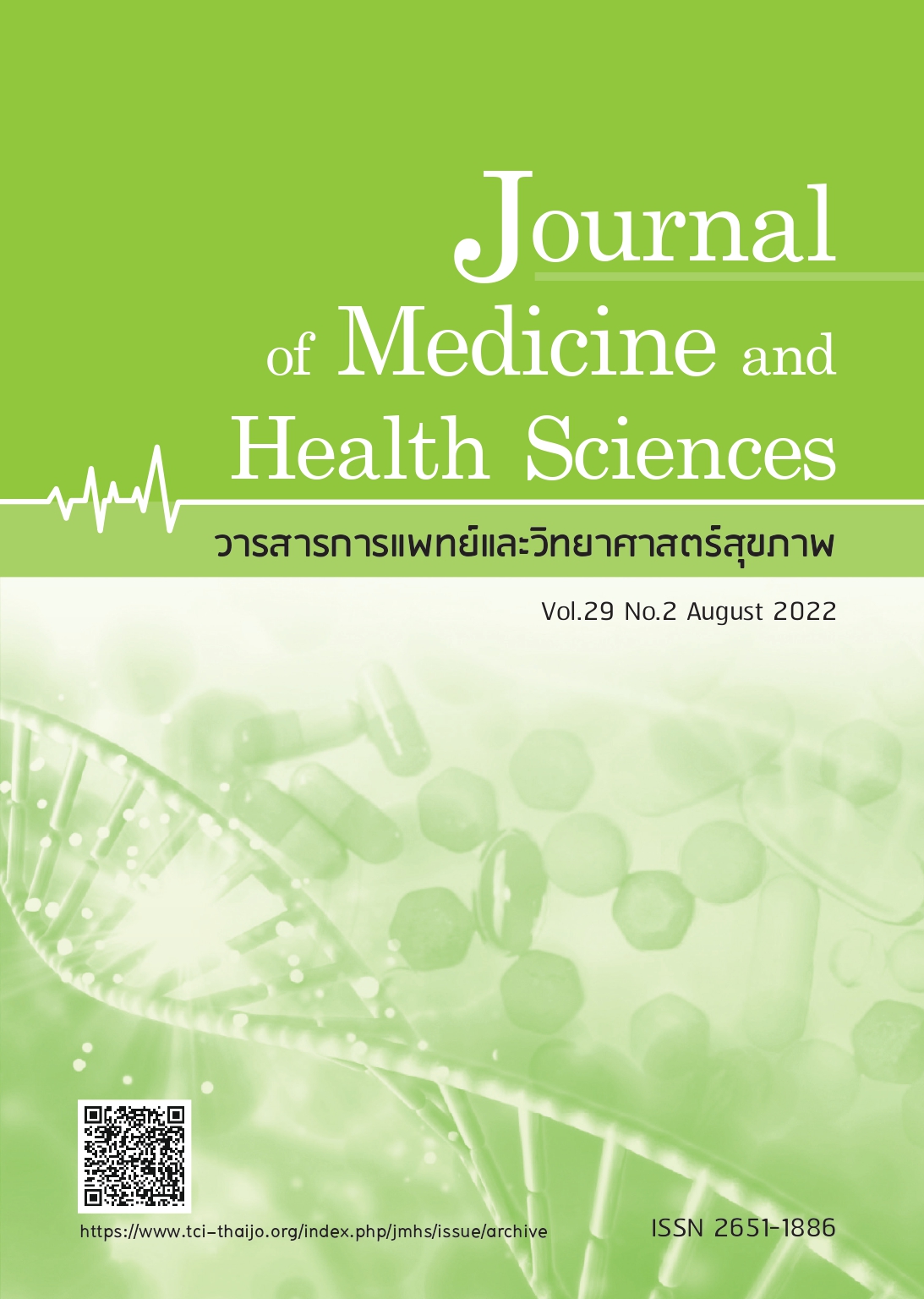Neuroprotective effects of vetiver oil against corticosterone-induced cell death in human neuroblastoma SH-SY5Y cells through antioxidant activity
Keywords:
Depression, Vetiver oil, Caspase-3, Lactate dehydrogenase, Cell viability, AntioxidantsAbstract
Abstract
Vetiver oil is known to reduce stress and depression. The pathophysiology of depression is associated with neuronal damage, especially from increased free radicals. Therefore, the aim of this study was to investigate the antioxidant activities of vetiver oil on corticosterone-induced apoptosis in neuroblastoma SH-SY5Y cells. The cells were treated with 650 μM of corticosterone in the absence or the presence of vetiver oil (0.025, 0.05, 0.1, 0.25, 0.5, 1, 1.5, 2.5, 5 μg/ml) compared with fluoxetine 10 μM for 24 hours. Cell viability was measured by MTT assay. Lactate dehydrogenase (LDH), caspase-3 and reactive oxygen species (ROS) were investigated by spectrometry and ELISA techniques, respectively. Corticosterone significantly decreased cell viability while vetiver oil (0.1 μg/ml) significantly reversed the decreased viability induced by corticosterone. Cells treated with corticosterone significantly increased LDH release, but vetiver oil at 0.025, 0.05, 0.5, 0.1, 0.25 and 0.5 μg/ml and fluoxetine 10 μM attenuated increased LDH
release from cells due to corticosterone-induced cytotoxicity. Interestingly, corticosterone significantly increased caspase-3, while vetiver oil but not fluoxetine attenuated this increase. Vetiver oil (0.025, 0.05, 0.5, 0.1, 0.25, 0.5 μg/ml) and fluoxetine suppressed intracellular ROS was induced by corticosterone. The findings demonstrated that vetiver oil had a neuroprotective effect. The mechanism by which the neuroprotective effects of vetiver on corticosterone-induced neurotoxicity in SH-SY5Y cells may involve antioxidant activity.
References
Qin DD, Rizak J, Feng XL, et al. Prolonged secretion of cortisol as a possible mechanism underlying stress and depressive behaviour. Sci Rep
;6:30187.
Ferguson JM. SSRI antidepressant medications: Adverse effects and tolerability. Prim Care Companion J Clin Psychiatry 2001;3:22-7.
Perry N, Perry E. Aromatherapy in the management of psychiatric disorders:Clinical and neuropharmacological perspectives. CNS Drugs 2006;20:257-80.
Santarsieri D, Schwartz TL. Antidepressant efficacy and side-effect burden: a quick guide for clinicians. Drugs Context 2015;4:212290.
Sánchez-Vidaña DI, Ngai SPC, He W, et al. The effectiveness of aromatherapy for depressive symptoms: A systematic review. Evid Based Complement Alternat Med 2017;2017:5869315.
Rafii F, Ameri F, Haghani H, et al. The effect of aromatherapy massage with lavender and chamomile oil on anxiety and sleep quality of patients with burns. Burns 2020;46:164-71.
Fung JKKM, Tsang HWH. Management of behavioural and psychological symptoms of dementia by an aroma-massage with acupressure treatment protocol: A randomised clinical trial. J ClinNurs 2018; 27:1812-25.
Ebrahimi H, Mardani A, Basirinezhad MH, et al. The effects of Lavender and Chamomile essential oil inhalation aromatherapy on depression, anxiety and stress in older community-dwelling people: A randomized controlled trial. Explore (NY) 2022;18:272-8.
Chaiyasut C, Sivamaruthi BS, Wongwan J, et al. Effects of Litseacubeba (Lour.) Persoon essential oil aromatherapy on mood states and salivary cortisol levels in healthy volunteers. Evid Based Complement Alternat Med 2020;2020:4389239.
Faturi CB, Leite JR, Alves PB, et al. Anxiolytic-like effect of sweet orange aroma in Wistar rats. Prog Neuropsychopharmacol Biol Psychiatry 2010;34:605-9.
Saiyudthong S, Pongmayteegul S, Marsden CA, et al. Anxiety-like behaviour and c-fos expression in rats that inhaled vetiver essential oil. Nat Prod Res 2015;29:2141-4.
Saiyudthong S, Srijittapong D, Mekseepralard C. Subchronic administration of linalool decreases depressive-like behaviour in restrained rats. J Pharm Pharmacol 2017;5:401-7.
Ogata K, Ataka K, Suzuki H, et al. Lavender oil reduces depressive mood in healthy individuals and enhances the activity of single oxytocin neurons of the hypothalamus isolated from mice: A preliminary study. Evid Based Complement Alternat Med
;2020:5418586.
Mohankumar A, Kalaiselvi D, Levenson C, et al. Antioxidant and stress modulatory efficacy of essential oil extracted from plantation-grown Santalum album L. Ind Crops Prod 2019;140:111623.
Aboul-Fotouh S. Coenzyme Q10 displays antidepressant-like activity with reduction of hippocampal oxidative/nitrosative DNA damage in chronically stressed rats. Pharmacol Biochem Behav 2013;104:105-12.
Ali B, Al-Wabel NA, Shams S, et al. Essential oils used in aromatherapy: A systemic review. Asian Pac J Trop Biomed 2015;5:601-11
Gupta D, Radhakrishnan M, Kurhe Y. Effect of a novel 5-HT3 receptor antagonist 4i, in corticosterone-induced depression-like
behavior and oxidative stress in mice.Steroids 2015;96:95-102.
Subhadradevi V, Asokkumar K, Umamaheswari M, et al. In vitro antioxidant activity of Vetiveriazizanioides root extract. Tanzan Health Res Bull 2010;12:1-7.
Luqman S, Kumar R, Kaushik S, et al.Antioxidant potential of the root of Vetiveriazizanioides (L.) Nash. Indian J Biochem Biophys 2009;46:122-5.
Jantas D. Cell-based systems of depression: An overview. In: Herbal medicine in depression. Springer International Publishing;2016:75-117.
Zhang F, Shao J, Tian J, et al. Antidepressantlike effects of LPM580153, A novel potent triple reuptake inhibitor. Sci Rep 2016;6:24233.
Kumar P, Nagarajan A, Uchil PD. Analysis of cell viability by the lactate dehydrogenase assay. Cold Spring Harb Protoc 2018;2018:095497.
Yu Z, Kong D, Liang Y, et al. Protective effects of VMY-2-95 on corticosteroneinduced injuries in mice and cellular models. Acta Pharm Sin B 2021;11:1903-13.
Zhang H, Liu B, Wu J, et al. Icariin inhibits corticosterone-induced apoptosis in hypothalamic neurons via the PI3-K/Akt signaling pathway. Mol Med Rep 2012;6:967-72.
Ziru Yu Z, Kong D, Liang Y, et al. Protective effects of VMY-2-95 on corticosteroneinduced injuries in mice and cellular models. Acta Pharmaceutica Sinica B 2021;11:1903e1913.
Hwang S, Kim JK. Fluoxetine induces apoptotic and oxidative neuronal death associated with the influx of copper ions in cultured neuronal cells. Chonnam Med J 2020;56:20-6.
Kim HJ, Chen F, Wang X, et al. Evaluation of antioxidant activity of vetiver (Vetiveria zizanioides L.) oil and identification of its antioxidant constituents. J Agric Food Chem 2005;53:7691-5.
Downloads
Published
How to Cite
Issue
Section
License

This work is licensed under a Creative Commons Attribution-NonCommercial-NoDerivatives 4.0 International License.



